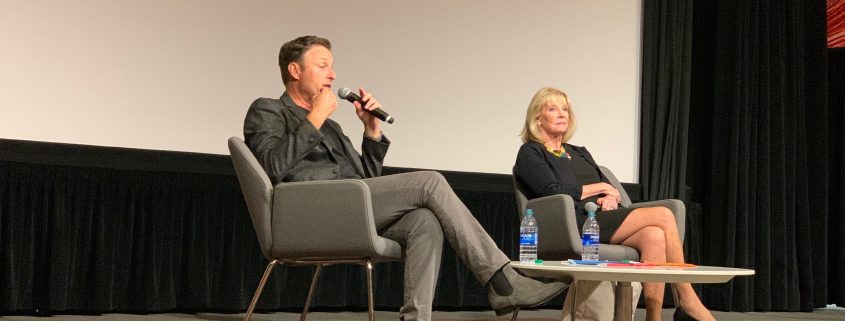‘The Bachelor’ host talks diversity in the franchise

(Tomás Mier | Daily Trojan)
Chris Harrison, host of “The Bachelor” and other shows in the franchise, discussed diversity and the behind-the-scenes of the reality television series to an audience of more than 200 in Wallis Annenberg Hall Monday.
Two minutes before Harrison was set to arrive in a Wallis Annenberg Hall classroom to speak about his career and experience with the ABC reality television show, the event was relocated to the auditorium to accommodate the influx of audience members. The event was hosted by Annenberg School for Communication and Journalism associate professor of professional practice Mary Murphy for her journalism class titled “Entertainment, Business and Media in Today’s Society.”
One audience member said that despite loving the show, she has noticed a lack of people of color on it. She said she roots for the people who look like her just so she can see them on television more. She asked if the producers are conscious of this and if more representation can be expected in the future.
Harrison said the show casts people from across the country and focuses on their potential storylines, but he admitted that it did not do a good job at assembling a diverse cast when it first started in 2002. He claimed that representation has improved in the franchise.
“It was incumbent on us to change that narrative, and we have done that,” Harrison said. “Over the last several years, we have taken great strides in … trying to make you feel more represented. While I would love to only make great social statements and really change the world, I can’t just do that because we have to stay on the air … or I’m not making a social statement to anyone.”
Harrison also explained that many of the people behind the cameras are of different races and sexual orientations.
Representation in the franchise came up again when another student asked about the likelihood of casting a gay bachelor. Harrison ultimately said that he does not know if or when it would happen.
Harrison said he doesn’t believe “The Bachelor” changes culture but that the show has evolved as culture has changed. He brought up Rachel Lindsay, the first African American bachelorette in the show’s 13th season, and Demi Burnett, the first contestant to have a same-sex relationship on the franchise in the fifth season of “Bachelor in Paradise” as examples of the show’s evolution.
“You have to take it as it comes … because then it’s organic and then it feels right,” Harrison said. “When you try to force things is when it backfires on you … We took that step in that we had our first African American, but I didn’t look at her and go, ‘So happy she’s Black.’ I’m happy that she’s a badass woman, and oh by the way she also happens to be African American.”
When discussing the line between actual reality and reality made for television, Harrison emphasized that the contestants are real people who he and the producers care about, drawing parallels to his experience as a father of two teenagers.
“You kind of have to take your hand off the wheel and let stuff happen,” Harrison said, explaining the true reality aspect of “The Bachelor.”
None of what the contestants say, he said, is ever scripted. However, the producers create environments and moments that force contestants to “deal with each other.”
Throughout the entire event, which went overtime because of the large number of audience questions, Harrison made inside-jokes that referenced the most recent seasons of “The Bachelor” franchise and joked with the audience.
“It was really cool to see him, because we’re so used to seeing him on camera,” said Maggie Morris, a junior majoring in journalism. “And for him to be in person so down to earth, it was great.”

